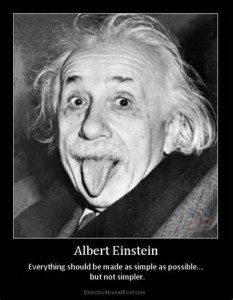♫ Albert Einstein
I got an idea and it’s really bright
Somebody in my brain just turned on the light…♫
Lyrics, music and recorded by Avias.
This is another great leadership post from Beth Flynn at the THE OHIO STATE UNIVERSITY LEADERSHIP CENTER (www.leadershipcenter.osu.edu).
This post highlights the principles that helped shaped Albert Einstein into a leader and successful scientist. They are taken from Smithson, D. (2014). What managers don’t know: how to be a better manager, leader, and entrepreneur? Theinformbook.com
“Many people think that Einstein was just a simple scientist who went about formulating the laws that govern the Universe, but he was so much more than that.
Apart from being the man who had the greatest single impact on the advancement of our understanding of the laws that govern the physical universe, Einstein was also a philosopher king! Following are some of his musings (ESP), along with how they can relate to your business.
ESP 1: ‘The search for truth is more precious than its possession.’ This of course links back into the idea that you should never stop learning, asking questions so that you can learn.
ESP 2: ‘Imagination is more important that knowledge.’ This ESP is one of those ideas that has no direct application, but is such a powerful belief to install within your psyche; it can influence everything you do.
ESP 3: ‘No amount of experimentation can ever prove me right; a single experiment can prove me wrong.’ In science, nothing is ever 100% true. Think about that axiom. True science merely posits a theorem that should be successful tested and validated by other independent scientists, raises up a ranking to being a theory. This relates to the ideas of leadership. A leader is often only ever as good as his or her last successful decision.
ESP 4: ‘Most people say that intellect that makes a great scientist. They are wrong: it is character.’ Apart from having a brain the size of a planet, Einstein was a man of constant inquisition, determination and almost child-like playfulness. So whilst you are getting your business qualifications, do so without sacrificing your social and thinking skills. If you are lacking in some areas, then go outside your comfort zone and learn how to gain those skills.
ESP 5: ‘It’s not that I’m so smart, it’s just that I stay with problems longer.’ Einstein was an amazingly humble man, but this typical self-effacing statement reveals much of the secret of his success. He simply refused to give up. In everything he did, Einstein took the approach of an outstanding man who wanted to achieve outstanding things.
ESP 6: ‘You learn the rules of the game. And then you have to play better than anyone else.’ If you want to become a success you have to first get into the game, and to do that you have to understand what the rules are. Once you’ve got that locked down, you have to practice and compete constantly – and if necessary, push for a change in the rules!!!
ESP 7: ‘Anyone who has never made a mistake has never tried anything new.’
I have made (and continue to make) mistakes, ranging from minor inconveniences to absolute oh my lord pass me on a gun now! But I never stop trying because I have a very simple philosophy: I never fail, so long as I learn something new (even, as I said, if that something new is a mistake – I won’t ever do that again.
ESP 8: ‘To stimulate creativity one must develop childlike inclination for play and childlike desire for recognition.’ My outlook on life is simple, I want to experience everything I can before I get to the final destination.
ESP 9: ‘Great ideas often receive violent opposition from mediocre minds.’ It is said that we go through three stages of development. First it is met with derision. Then it is confronted with hostility and aggression. Finally, it is accepted as playfully self-evident. This is especially true when your great idea is a challenge to the established way of doing things, or contrary to the idea of the one who sits above you (p. 211-291).”
WANT TO DISCUSS TODAY’S LEADERSHIP MOMENT?
Go to the Ohio State Leadership’s blog and share your thoughts, ideas, or answer the questions below.
- Which of these ESP principles had the biggest impact on you?
- What are some ways you can integrate these principles into your work life?
Thanks Beth for helping us all turn on the light in our brains!
One Response to “The Einstein Principle!”




















June 2nd, 2014 at 6:33 am
The Einstein quote I like is ‘not everything that counts can be counted, and not everything that can be counted counts’ (or maybe the reverse order, but the same principle.) In the days when governments or candidates promise to reduce ‘the number of regulations’ by some percentage, one has to keep Einstein in mind. It shows that those making the promise are no Einsteins.
The temptation to make social policy sound like hard science by generating numbers is strong but not always sound – it takes judgment to know when to do it and when not, and matters of judgment can be hard to explain to a public (or a politician) with a short attention span and other priorities.